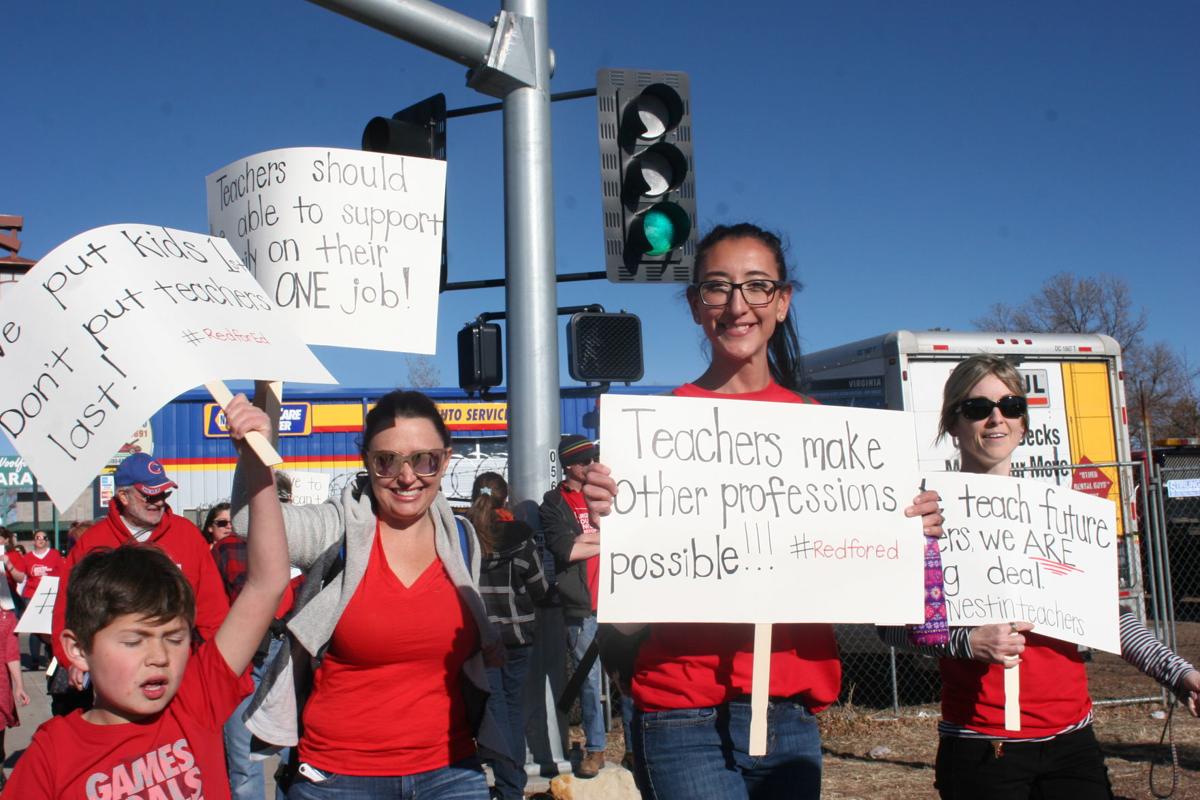
PHOENIX — Calling the governor’s proposal inadequate, leaders of the #RedForEd movement have scheduled a vote this week to decide by Friday whether to strike.
In a statement late Sunday, key organizers said the plan by Gov. Doug Ducey to hike salaries of teachers by 19 percent by 2020 does not meet the key goal of getting education funding back to where it would have been now had lawmakers not made a series of cuts during the Great Recession. They said classroom sizes are still too large and equipment needs are unmet.
But Noah Karvelis, one of the leadership team members of Arizona Educators United, said there’s something even more basic.
“We don’t have a sustainable revenue source to fund these raises,” he said. “What that means is that these are empty promises.”
Gubernatorial press aide Daniel Scarpinato said Monday his boss is convinced that the growth of the state economy will lead to greater tax revenues.
He said tax collections are running well ahead of projections. That could cover the $274 million first-year cost of both the 1 percent raise that Ducey already promised earlier this year plus an additional 8 percent in his new plan.
But that leaves the question whether there will be enough to sustain those pay hikes, much less the additional 5 percent Ducey has promised for the 2019-2020 school year and another 5 percent the following year.
The governor’s office has estimated the ultimate price tag at more than $670 million, above and beyond the regular state aid to education.
On top of that, Ducey is promising to restore the $371 million that was taken from schools they are supposed to get for capital needs like books, computers and school buses.
“Sustainability is absolutely critical,” agreed Tim Ogle. But the executive director of the Arizona School Boards Association isn’t sure it will take a strike to guarantee the dollars will be there.
“Our job is to hold decision makers accountable,” he said. And Ogle said there are legislators who apparently are willing to put the governor’s funding promises into law.
“It’s silly to say ‘no’ to that,” he said.
Scarpinato said the state will have more than $1 billion to both fund the raises and restore the dollars cut from school capital needs. Aside from a healthier economy producing more tax dollars, Scarpinato said fewer people will need state services like health care.
But Joe Thomas, president of the Arizona Education Association, warned against relying on future promises.
“Don’t believe anything besides what they put in the budget,” he said. Thomas said even if the additional 9 percent is funded this year.
“A legislature that says they’re going to give us a 5 percent raise in a budget a year away, well they might as well promise every kindergarten teacher a pony.”
Even if funds for teacher pay are identified, Ducey’s plan does not include others, like school counselors, custodians and lunchroom workers. And then there’s the issue of adequate funding for classrooms.
“My students deserve upgraded, modern, 21st century technology,” said Catherine Barrett, a reading specialist in the Phoenix Union High School District.
Others said the problems are even more basic.
“My students deserve to have repairs on their buildings and working plumbing and holes in walls patched,” said Derek Harris who teaches band in the Tucson Unified School District.
Kellee Wolfe who teaches sixth grade language arts in the Lake Havasu Unified School District said her students need working air conditioners. And Kelley Fisher complained about the lack of bus drivers for the kindergartners at Deer Valley Unified School District as well as the fact there are not speech teachers on each campus.
Dylan Wegela, a seventh grade social studies teacher in the Kyrene Elementary School District, said students need smaller class sizes.
“I can’t walk back into my classroom without getting more for our students and this movement,” he said.
Harris said paper ballots will be distributed today (eds: Tuesday), with a “vote-in” on Wednesday and results announced Friday.
He acknowledged that Arizona Educators United can’t force teachers to walk out.
“But peer pressure can be very important,” Harris said. He said that’s why any decision will need something more than a simple majority, though organizers have no firm threshold. And Harris said they also want support for a walkout from education groups across the state and not just from the state’s metropolitan areas.
Ogle said it isn’t the job of his association to tell the employees what they should do.
But if there is a message, Ogle said, it is to remember that it has been the educators and their organizations that have gotten Arizona to the point where the governor, who last year had recommended a pay hike of just 0.4 percent, is now making this offer.
“Without their collective efforts, we wouldn’t be having these discussions,” he said.
“That’s a tremendous win,” Ogle continued. “And I hope they celebrate it.”
There’s also the question of how much more money a strike might produce — if any.
In Oklahoma, just the threat of a walkout produced raises of about $6,100 per teacher and $1,250 for other school professionals. Teachers walked anyway, seeking not just more money in salaries but also $200 million more for other classroom needs, versus the $50 million lawmakers provided.
Nine days later, however, the strike ended, with Alicia Priest, president of the Oklahoma Education Association saying that is “all that we will be able to accomplish this legislative session.”
Harris, however, said the fact there are elections this year in Arizona could put more pressure on lawmakers to pony up some additional dollars.
Scarpinato said Ducey is not advising educators how to vote. But he said it will take their support to get what the governor has proposed through the Legislature where there is likely to be some opposition to committing to spend that much in new dollars.
Others have their own questions beyond the sustainability of the funding.
Julie Erfle, spokeswoman for AZ Schools Now, said her coalition wants to know whether Ducey and the Republican-controlled Legislature plan to enact tax cuts that will undermine future revenues. She also said there are concerns about more tax dollars being diverted to help students attend private and parochial schools.
On that last point, there is at least one measure that already has been approved by the Senate and awaits House action that would eases the rules for students to get money for vouchers as well as scholarships to these private schools. Legislative budget analysts said that could be a $2 million hit to state revenues.
– Originally written by Howard Fischer. Published by White Mountain Independent on 04/16/2018.
